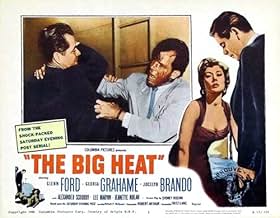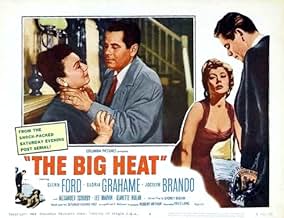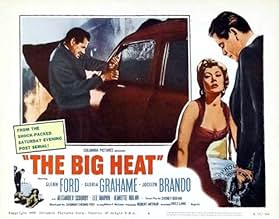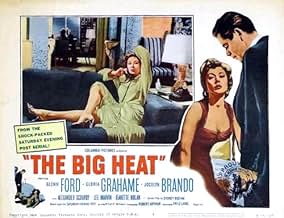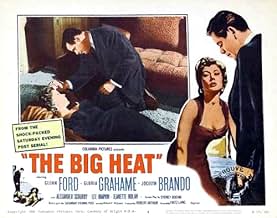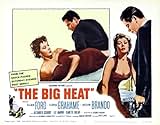CALIFICACIÓN DE IMDb
7.9/10
31 k
TU CALIFICACIÓN
El policía Dave Bannion se enfrenta a una organización criminal con ramificaciones políticas.El policía Dave Bannion se enfrenta a una organización criminal con ramificaciones políticas.El policía Dave Bannion se enfrenta a una organización criminal con ramificaciones políticas.
- Dirección
- Guionistas
- Elenco
- Premios
- 2 premios ganados y 2 nominaciones en total
- Dirección
- Guionistas
- Todo el elenco y el equipo
- Producción, taquilla y más en IMDbPro
Opiniones destacadas
Glenn Ford is a police sergeant seeking retribution for the death of his wife in "The Big Heat," a 1953 film that also stars Gloria Graham and Lee Marvin. While investigating a police officer's alleged suicide, Ford's idyllic family life is ruptured when his lovely young wife is killed in a car bombing intended for him. Some have suggested the similar scene in "The Godfather" was inspired by "The Big Heat." It's certainly possible.
For 1953, the violence is uncompromising, particularly against the female character played by Gloria Graham when she crosses her boyfriend, Lee Marvin, in one of his early roles. Marvin is fantastic as a brute, and this characterization must have done a lot to raise his profile in films.
There are some outstanding performances, including that of Jeannette Nolan as the late officer's wife who knows plenty. Glenn Ford, a handsome, solid actor who seems forgotten now, underplays his role but the coldness and rage he feels is evident as he goes from happy family man to angry avenger.
Excellently directed by Fritz Lang, "The Big Heat" packs a wallop.
For 1953, the violence is uncompromising, particularly against the female character played by Gloria Graham when she crosses her boyfriend, Lee Marvin, in one of his early roles. Marvin is fantastic as a brute, and this characterization must have done a lot to raise his profile in films.
There are some outstanding performances, including that of Jeannette Nolan as the late officer's wife who knows plenty. Glenn Ford, a handsome, solid actor who seems forgotten now, underplays his role but the coldness and rage he feels is evident as he goes from happy family man to angry avenger.
Excellently directed by Fritz Lang, "The Big Heat" packs a wallop.
Normally, when I think of Film Noir, I DON'T think about Glenn Ford. Yes, he did a few, but his personality always seemed a little too "nice" to play in these gritty films. I was very pleasantly surprised then, when I saw this movie. Ford is an honest cop in a very crooked town. However, when the mob attacks and nearly kills him (killing his wife instead), he "pops a fuse" and becomes a very tough cop who won't take NO for an answer. I loved watching him slap people around and threaten his way to the top of the syndicate, as, with his life in ruins, he had nothing to lose.
Along the way, the headstrong Ford encounters a lot of amazing characters--all played exceptionally well. In particular, a young Lee Marvin gives perhaps his best supporting performances as a hood who has a penchant for beating up women. In one scene, he nearly breaks a bit actress' arm (and it happens to be Carolyn Jones in a performance before she was famous). In another scene, he throws scalding hot coffee in the face of his girlfriend, Gloria Grahame. It was so brutal and realistic, I flinched and found my stomach churning at its ferocity and cruelness. As for Miss Grahame, she plays the sort of excellent role she became known for--a "dame" who, down under layers and layers of scum, beats a real human heart.
Wonderful performances, terrific pacing and excellent writing make this one film well worth seeing and as a result, it's one of the best examples of Film Noir out there and a great example of a film about a cop who's seen enough and is on a rampage. This is probably Glenn Ford's best performance.
FYI--In what appears to be a cool inside joke, in one of the scenes where Ford is in the bar, the song "Mame" is playing in the background--the same song made so memorable by Rita Hayworth in GILDA--a Glenn Ford film from 1946.
Also FYI--I recently saw this film for the second time. I rarely watch films twice, but this one impressed me so much the first time, I couldn't resist. The film was, believe it or not, better the second time around and I noticed so many wonderful Film Noir touches that I truly love this movie.
Along the way, the headstrong Ford encounters a lot of amazing characters--all played exceptionally well. In particular, a young Lee Marvin gives perhaps his best supporting performances as a hood who has a penchant for beating up women. In one scene, he nearly breaks a bit actress' arm (and it happens to be Carolyn Jones in a performance before she was famous). In another scene, he throws scalding hot coffee in the face of his girlfriend, Gloria Grahame. It was so brutal and realistic, I flinched and found my stomach churning at its ferocity and cruelness. As for Miss Grahame, she plays the sort of excellent role she became known for--a "dame" who, down under layers and layers of scum, beats a real human heart.
Wonderful performances, terrific pacing and excellent writing make this one film well worth seeing and as a result, it's one of the best examples of Film Noir out there and a great example of a film about a cop who's seen enough and is on a rampage. This is probably Glenn Ford's best performance.
FYI--In what appears to be a cool inside joke, in one of the scenes where Ford is in the bar, the song "Mame" is playing in the background--the same song made so memorable by Rita Hayworth in GILDA--a Glenn Ford film from 1946.
Also FYI--I recently saw this film for the second time. I rarely watch films twice, but this one impressed me so much the first time, I couldn't resist. The film was, believe it or not, better the second time around and I noticed so many wonderful Film Noir touches that I truly love this movie.
Effective film noir about a cop fighting the mob as well as his own corrupt superiors as he investigates a murder. Ford has perhaps the best role of his career as the good cop. His scenes with wife Brando are very nicely handled, adding poignancy to the tragedy that would befall the family. There are shades of Dirty Harry as Ford takes matters into his own hands. Marvin and Grahame are also good as a mobster and his moll, respectively. Lang, a master of this sort of film-making, keeps things moving at a snappy pace. Some of the violence is jarring but of course nothing graphic is shown, given the era the movie was made in. After an excellent start, the second half of the film becomes somewhat routine but it still packs a punch.
An honest, family man cop with a wife and daughter is put onto the investigation of another cop's suicide. He closes the case as suicide due to ill health. However when a women tells him another story and is promptly killed, Bannion just investigates further to find that powerful criminals and powerful politicians share the same table at dinner. When his family is split in an attack meant for him he loses his job and becomes bitter he starts to become more like his enemies as he pursues them.
This is a hardboiled thriller that would still stand up today as a tough film violence and attitudes that make it feel more modern than it is. The story follows the descent of family man Bannion into violence and bitterness when he not only loses what is important to him, but when he finds that corruption at high levels has fed down into rank and file officers causing him to stand out when he tries to catch a criminal.
The brutality of this film shouldn't be underestimated Fritz Lang is no softy! Here we have women beaten and killed, we have sex crimes, we have a women disfigured by scalding coffee in her face. Of course all these things are unseen but this was the 50's! However it is still powerful and adds to the intensity of the film. The story may well have been done many times now but imagine seeing something like this back then!
The cast are great. Ford descends into bitterness really well and seems at ease as both thug and family man. The female cast are good in different ways but the one that catches the eye is a young Lee Marvin. I suspect Marvin got fame because his coffee attack stuck in people's minds even today he is best know as a tough guy in the movies.
Overall this is well worth hunting out it is still being copied by many video thrillers and it just goes to show that you don't have to show gory or graphic violence on screen to be powerful, gritty or shocking.
This is a hardboiled thriller that would still stand up today as a tough film violence and attitudes that make it feel more modern than it is. The story follows the descent of family man Bannion into violence and bitterness when he not only loses what is important to him, but when he finds that corruption at high levels has fed down into rank and file officers causing him to stand out when he tries to catch a criminal.
The brutality of this film shouldn't be underestimated Fritz Lang is no softy! Here we have women beaten and killed, we have sex crimes, we have a women disfigured by scalding coffee in her face. Of course all these things are unseen but this was the 50's! However it is still powerful and adds to the intensity of the film. The story may well have been done many times now but imagine seeing something like this back then!
The cast are great. Ford descends into bitterness really well and seems at ease as both thug and family man. The female cast are good in different ways but the one that catches the eye is a young Lee Marvin. I suspect Marvin got fame because his coffee attack stuck in people's minds even today he is best know as a tough guy in the movies.
Overall this is well worth hunting out it is still being copied by many video thrillers and it just goes to show that you don't have to show gory or graphic violence on screen to be powerful, gritty or shocking.
A violent story about a detective working in a corrupt department who investigates the apparent suicide of a fellow officer. Worth seeing for Glenn Ford's prototypical performance and Gloria Grahme's show stealing portrayal of a boozing moll with a conscience. With facial disfigurement and cigarette burns it took violence up a notch from the standard gun play of the past, making it grimmer and more realistic, and giving the story more punch. Grahme's tough and tender role stands out and gives the film a tragic element, while certain of its portrayals of greed and corruption (namely the dead officer's wife) stand out for their attention to detail. In the end, it IS the details that give this formulaic story its clout, and we can thank director Fritz Lang for that.
¿Sabías que…?
- TriviaColumbia wanted to borrow Marilyn Monroe from 20th Century-Fox to play the role of Debby Marsh, but Fox's asking price was too high. Gloria Grahame was cast instead.
- ErroresThe street address for the junkyard on Bannion's list is "101", yet the number "1024" is seen on a large sign over the yard's shed.
- Citas
Debby Marsh: [to Bannion] Oh, well, you're about as romantic as a pair of handcuffs.
- ConexionesFeatured in Calles peligrosas (1973)
- Bandas sonorasIt's a Blue World
(uncredited)
Written by Chet Forrest and Bob Wright
Heard instrumentally during one of the scenes at The Retreat
Selecciones populares
Inicia sesión para calificar y agrega a la lista de videos para obtener recomendaciones personalizadas
- How long is The Big Heat?Con tecnología de Alexa
- New York Opening Happened When?
- Chicago Opening Happened When and Where?
Detalles
- Fecha de lanzamiento
- País de origen
- Idioma
- También se conoce como
- The Big Heat
- Locaciones de filmación
- Productora
- Ver más créditos de la compañía en IMDbPro
Taquilla
- Total a nivel mundial
- USD 7,083
- Tiempo de ejecución1 hora 29 minutos
- Color
- Relación de aspecto
- 1.37 : 1
Contribuir a esta página
Sugiere una edición o agrega el contenido que falta

Principales brechas de datos
What is the Japanese language plot outline for Los sobornados (1953)?
Responda

